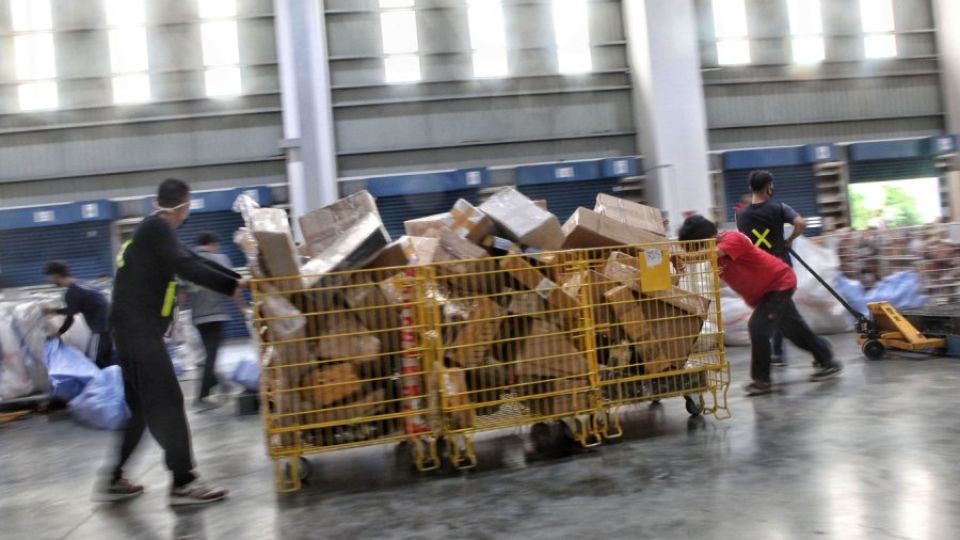November 13, 2023
JAKARTA – While the government has pledged to crack down on low-value imported goods, The Jakarta Post encountered no problems purchasing shoes for less than US$4 a pair from e-commerce platforms.
Trade Ministry Regulation No. 31/2023, which effectively discontinued the operations of TikTok Shop in Indonesia, requires local e-commerce companies to charge a minimum freight on board (FOB) price of $100 per imported product sold on their platforms.
The regulation was issued in response to widespread complaints about foreign producers allegedly dumping their goods into the local market through online marketplaces, to the detriment of domestic manufacturers.
Meanwhile, footwear can still be had for $4 or less on the country’s major e-commerce platforms, which begs the question of just how effective the regulation is in curbing sales of low-value consumer goods, if indeed that was ever its intention.
To find out, the Post purchased two pairs of sneakers from different e-commerce platforms, one for Rp 57,000 ($3.63) and the other for a mere Rp 9,500.
The first pair does not look significantly different from the product photo on the merchant’s storefront, though the sole seems narrower in real life. There was no mention about the footwear’s origin on either the merchant’s storefront or the product received.
The merchant gave no precise answer when the Post enquired about where the sneakers were produced, saying only that they had been “sent from” West Java.
A month ago, the Post visited Tanah Abang Market, a prominent retail center in Indonesia. During that visit, several sellers there demanded the government to completely shut down e-commerce platforms to foster “fair competition” in the domestic market.
Some sellers argued that the quality of the products sold online wasn’t high enough.
The government has not considered such drastic action, however, as opponents of the move argue that it would hinder the development of Indonesia’s digital economy.
It would hardly be fair to expect high quality at a price point below $4, and while the sneakers were not particularly comfortable, they did fit and looked the part in the current fashion trend. How long they will last remains to be seen, though.
Speaking to the Post last month, Bhima Yudhistira Adhinegara, executive director of the Center of Economic and Law Studies (CELIOS), highlighted the absence of legislation regulating discounts and promotions, such as free shipping.
The recent Trade Ministry regulation also did not include any restrictions on such practices, he added, saying this allowed predatory pricing to persist.
“The Business Competition Supervisory Commission [KPPU] has the potential to play a crucial role in curbing predatory pricing. For example, it is imperative that imported goods undergo thorough certification and are not packaged together,” Bhima said.
“As a result of e-commerce platforms providing [extensive special offers] and free shipping, numerous offline vendors are unable to compete in terms of prices.”
Andry Satrio Nugroho, who heads the Center of Industry, Trade and Investment at the Institute for Development of Economics and Finance (Indef), concurred.
He noted that the ministerial regulation would not prevent the sale of cheap imported goods on e-commerce platforms.
“If the sellers are based in Indonesia, import the items in bulk and sell them in the country, the regulation won’t be effective,” Andry told the Post on Friday.
He acknowledged that consumer buying power was driving demand for cheap goods via e-commerce platforms.
“We cannot deny that even in remote areas people have access to the internet, and since purchasing the cheapest product is their preferred option, this is increasing demand for inexpensive imported goods that are constantly available,” Andry said.
He also urged Indonesian consumers to use their purchasing decision to support domestic products, while noting a lack of effort on the part of local producers to make their products more affordable.
Andry brought up the textile sector as a case in point: Indonesia imports a significant volume of textile products from China and elsewhere due to local producers’ inability to compete on price.
“Indonesia could benefit from conducting a comparative study on the textile sector in other nations. When looking at China, it is important to examine whether the Chinese government provides support for the growth of the sector there,” he said.
“If that’s possible, [then] yes, we could rely more on our local products.”
Dandy Rafitrandi of the Centre for Strategic and International Studies (CSIS) Jakarta opined that after the recent changes, the prevailing regulations were adequate to safeguard fair trade and competition. However, numerous sellers might continue to sell stock that was imported before the latest changes took hold.
He stressed that better collaboration was needed between the customs office and other state institutions to improve monitoring and surveillance. Still, he expressed confidence that once harsher policies were implemented, e-commerce platforms or merchants would make some concessions.
Meanwhile, he expressed caution about simply banning cheap imported goods.
While the government might protect domestic producers through such a policy, Dandy said, it would come “at the expense of consumers, who will bear the burden of higher prices”.
“Therefore, it is imperative to review the implemented regulations in a comprehensive manner,” he said on Thursday.


